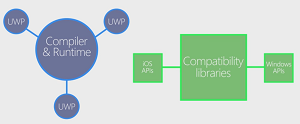News
With Android/Windows Bridge Stalled, Microsoft Moves Forward on iOS Project
- By David Ramel
- November 18, 2015
With the Project Astoria plan to allow the building of Windows 10 apps with Android code via emulation in big trouble, Microsoft is nevertheless moving forward on its similar Windows Bridge for iOS.
Microsoft made big news this week when it confirmed the Astoria project wasn't on track, perhaps facing emulation problems, legal problems or something else. While not talking about the problems much, Microsoft admitted the project "is not ready yet" amid widespread media reports of its postponement or even cancelation.
The iOS bridge -- dubbed Project Islandwood -- is getting ready, however, and Microsoft is seeking developer help to move it further along. "The Windows Bridge for iOS is a Microsoft open source project that provides an Objective-C development environment for Visual Studio and support for iOS APIs," Microsoft says on its redesigned landing page for the bridge. A 0.1 preview of the project was updated on GitHub last Thursday.
As development continues, Microsoft is seeking help from developers to test out a new app analyzer, company exec Nick Gerard wrote in a blog post today titled "Windows Bridge for iOS: Where we are and where we are headed."
"The response we've gotten from the community since August has been simply fantastic," Gerard said. "Over 4,500 of you starred the repo, and what's more, over 500 created your own fork. More than 200 issues have been filed (and several dozen closed, with many more in various stages of being fixed), and we've received a number of high quality pull requests, many of which we've already accepted."
 [Click on image for larger view.]
Components of the Windows Bridge for iOS (source: Microsoft)
[Click on image for larger view.]
Components of the Windows Bridge for iOS (source: Microsoft)
Gerard said Microsoft is working on an automatic app analyzer where developers will be able to upload their IPA files (used in iOS development) so they can be inspected to judge their compatibility with the bridge. "We're currently in the process of testing the app analyzer, but we need your help to make sure it's ready. We need IPAs to test our analysis pipeline with, so we've set up a form to accept submissions."
"We want to make it as easy as possible to get started with Windows Bridge for iOS," Microsoft says in that form page. "In the coming weeks, we'll be launching a Web tool that will automatically analyze your app for compatibility with the bridge and give you results right in your browser. You'll be able to see exactly how much work you'll have to do to bring your app to Windows, along with suggestions, tips and workarounds for any libraries you're using that the bridge doesn't support yet."
In the meantime, developers can get started now playing around with the iOS bridge by installing it from GitHub and then importing Xcode projects into Visual Studio with a vsimporter tool included with the WinObjC SDK, or by creating a completely new Universal Windows Platform app in Visual Studio using Objective-C, or by adding Objective-C support to an existing Visual Studio project.
According to the project wiki, there are still many features under development. These include autolayout, storyboard support, MapKit, AssetsLibrary, AddressBook, ads, Objective-C annotations, media capture and playback and ARM support (currently only x86 is supported).
"If you haven't been able to try out the bridge yet -- or aren't sure if it's right for your project -- we're also working on making it easier to get started. In the coming weeks, we'll be adding downloadable evaluation virtual machines (VMs) to our new site and from Dev Center. We'll offer the VMs in four pre-configured packages for different virtualization environments: Parallels, VMWare, VirtualBox and Hyper-V. Each flavor will be refreshed once a month with the latest version of Visual Studio 2015 Community Edition, Windows IoT Core, Windows Bridge for iOS, Windows SDK and all the Universal Windows Platform samples."
The only comment on Gerard's post so far, just a few hours old, reads: "... and the Android bridge? :)"
About the Author
David Ramel is an editor and writer at Converge 360.